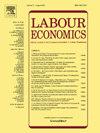针对长期失业者的积极劳动力市场政策:因果机器学习的新证据
IF 2.6
2区 经济学
Q2 ECONOMICS
引用次数: 0
摘要
积极的劳动力市场计划是欧洲职业介绍所用来帮助失业者找到工作的重要工具。通过调查德国长期失业人员的大量行政数据,我们使用因果机器学习分析了三个求职援助和培训计划的有效性。除了估计平均效应外,因果机器学习还可以系统地分析效应异质性,从而促进制定更有效的个性化长期失业分配策略。平均而言,参与者受益于所有项目的快速实现和持久的积极影响,其中安置服务是最有效的。对于女性,我们发现不同的特征会产生不同的影响。特别是,妇女受益于更好的当地劳动力市场条件。我们提出的将失业人员分配到可供决策者使用的劳动力市场计划的数据驱动规则,显示出将效果提高6%至14%的潜力。本文章由计算机程序翻译,如有差异,请以英文原文为准。
Active labor market policies for the long-term unemployed: New evidence from causal machine learning
Active labor market programs are important instruments used by European employment agencies to help the unemployed find work. Investigating large administrative data on German long-term unemployed persons, we analyze the effectiveness of three job search assistance and training programs using causal machine learning. In addition to estimating average effects, causal machine learning enables the systematic analysis of effect heterogeneities, thereby facilitating the development of more effective personalized allocation strategies for long-term unemployed. On average, participants benefit from quickly realizing and long-lasting positive effects across all programs, with placement services being the most effective. For women, we find differential effects in various characteristics. Especially, women benefit from better local labor market conditions. The data-driven rules we propose for the allocation of unemployed people to the available labor market programs, which could be employed by decision-makers, show a potential to improve the effects by 6 - 14 percent.
求助全文
通过发布文献求助,成功后即可免费获取论文全文。
去求助
来源期刊

Labour Economics
ECONOMICS-
CiteScore
3.60
自引率
8.30%
发文量
142
期刊介绍:
Labour Economics is devoted to publishing research in the field of labour economics both on the microeconomic and on the macroeconomic level, in a balanced mix of theory, empirical testing and policy applications. It gives due recognition to analysis and explanation of institutional arrangements of national labour markets and the impact of these institutions on labour market outcomes.
 求助内容:
求助内容: 应助结果提醒方式:
应助结果提醒方式:


